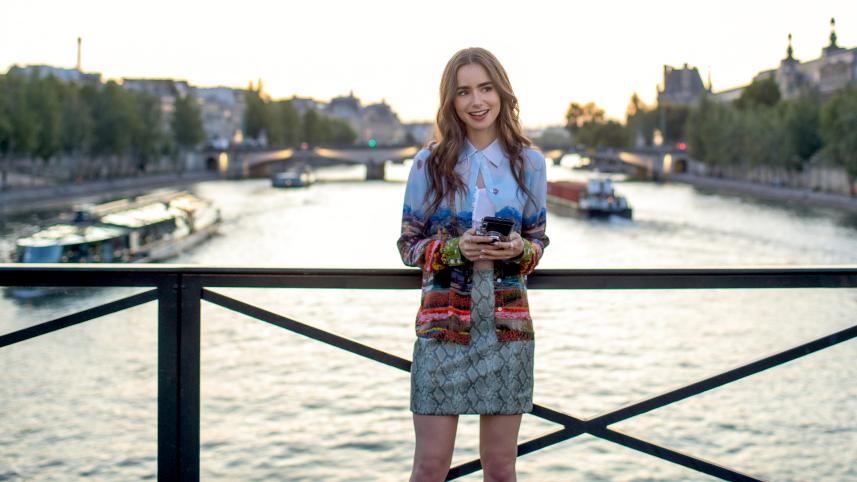Emily is you, if you’ve been to Paris

In 2017, I had landed in Paris as a graduate student with negligible knowledge of French ("Fake it till you make it," I said to myself), only to be hit by the reality check that to go even beyond the reception desk at my student accommodation, I would have to know their language well. Within a week I learned that: whether you're carrying books or an entire army of luggage, you might have to trudge up flights of dizzying wooden stairs in a centuries' old building; when navigating those steps at night, you will have to poke at the tiny circular light switches on every landing to access light for a few seconds; you will be subjected to delicious food at just about every corner of the city; and yes, when a Parisian man tries to flirt with you and finds out you have a boyfriend living far away, they will respond with, "Ah, so you don't have a boyfriend in Paris." On October 2 this year, I was transported back to this world.
So to those asking how realistic Netflix's Emily in Paris is in its depiction of expat experiences in the city, the answer is: just about enough. You'll find just enough details to be reminded of your first few days in Paris, to be wistfully hooked on, and next thing you know, you've binged the show in one sitting, only to realise later that the rest was all fanciful exaggeration.
If you haven't watched it yet, Emily in Paris follows Lily Collins' character Emily, an American marketing professional shipped off to Paris to initiate their newly acquired French marketing agency into the American world of social media hits and "woke" marketing. Emily is here to "bring an American perspective" into the Right Bank world of fashion shows, sparkly dinner parties, and perfume that wears like poetry. The show is frothy and upbeat, decadent with scenes of mostly Right Bank Paris—Champs Elysèes, Palais Royal, Palais Garnièr, sparkling views of the Seine flowing beneath the Eiffel Tower—and the characters are endearing and/or enviable caricatures of people you've already seen on the Devil Wears Prada or Me Before You.
In one scene while being accosted by Emily, an haute couture designer snarls, "I couldn't believe it was Dan," in response to her quaint tirade about Gossip Girl, and this is where the show gives away its philosophy—don't take it too seriously. It was created by Darren Star of Sex and the City and 90210 fame. It has plot holes, stock characters, garish clothes, cringe-inducing acting, and inexplicable love triangles that would be inexcusable in real life. As an audience who have been living on a healthy diet of escapist romcoms for nearly four decades, we should know how to approach such narratives by now: with a pinch of salt.
The same mantra applies to the show's stereotypical portrayal of "snooty" French people who despise Emily for sashaying in with and clinging on to her English, which has ruffled the feathers of quite a few French critics. Yet I believe this highlights an aspect of Anglophone imperialism that we are all too quick to forgive. I personally don't think there is anything rude about a city expecting you to learn their language and their ways if you're going to be living and working in it. For all its faulty representation, the show does capture the innate warmth of French hospitality, their ability to take a joke and find time for the beautiful things in life, like relishing their food and observing life around them. It also offers a much-needed political statement in a happy and palatable packaging—that fashion can and should now be about opening doors and not alienating mass chunks of the population, and that beauty isn't about catering to a male gaze. That the path to accepting these stances isn't always uncomplicated is portrayed with a fair bit of nuance in a show that is otherwise so saccharine.
The major flaw remains in its dealings with language. Emily is sent to market French products to a French audience in addition to an American one, yet her promotions are entirely in English and prove popular across Paris. Even when not speaking directly to her, the French locals all but dispose of French in their conversations midway through the season. This feels bizarre even by romcom-verse standards.
And finally, it would have been more refreshing to visit Paris not through the lens of an American, for a change. The perspective of an expat would still be essential in helping a global audience relate to local Parisian life; but this is 2020 and we've read The Moveable Feast, watched Midnight in Paris, mined the Lost Generation archives, we've done it all—can we not visit Paris from elsewhere in the world now?
Sarah Anjum Bari is editor of Daily Star Books. Reach her at sarah.anjum.bari@gmail.com or @wordsinteal on Instagram.



 For all latest news, follow The Daily Star's Google News channel.
For all latest news, follow The Daily Star's Google News channel.
Comments